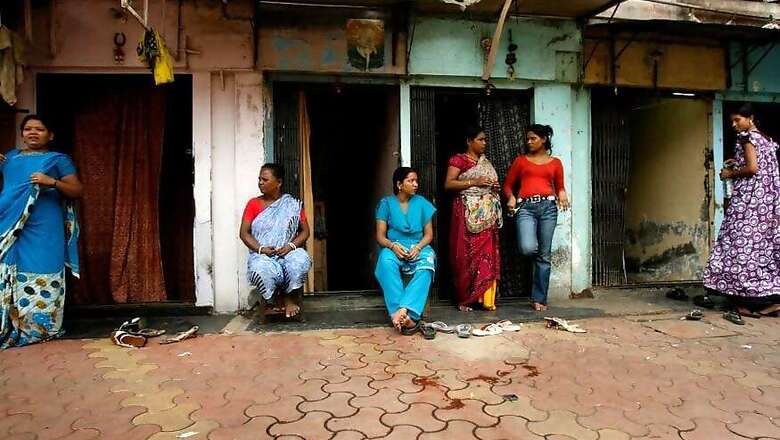
views
Covid-19 lockdown has hit the country in different manners. Be it rich, poor, or marginalised sections of the society, all have been facing its severe impact in their own ways. One such section of the society is of sex workers, who are struggling every day to survive as the nationwide lockdown has put a temporary end to their services, leading to financial crisis and lack of basic amenities like food and medicine.
However, even after battling with this, these sex workers are abiding by the rules of this lockdown even more responsibly than other Indians. More than anything, in a time of such grave crisis a network of sex workers are also bringing hope to those in their community who are staring at an uncertain future at this point.
"We, sex workers, have abided by every rule of this lockdown even more strictly than other Indians. Even now, when clients contact us, we say, 'our gullies are closed. Our services are shut. Go back.'" said Kiran Deshmukh, a Maharashtra-based sex worker, who is living with HIV.
"In the area where I live we have cordoned off the entire neighbourhood with a bamboo barrier to stop the entry of clients. If we are following every rule and advisories issued by the government, isn't it the government's responsibility too to take care of us?" she asked.
In Japan and many other Asian countries, sex services are not entirely legal. While in India it is against the law to run brothels or solicit sex in public under Immoral Traffic (Prevention) Act, 1956, Japan prohibits sexual intercourse in exchange of payment but allows other kinds of sex acts. However, since the outbreak of the pandemic, the Japan government has somewhat made an effort to take care of its sex workers by making financial aid available to them, though after facing criticism.
Unfortunately, no such benefit has been given directly to the sex workers in India so far. Several sex workers, especially migrant ones, are not ration cardholders, which cut them off from availing Public Distribution System (PDS) and other aids such as PM Garib Kalyan Ann Yojana, which provides 5 kg rice free of charge for three months, as well as benefits offered by states like Tamil Nadu and Delhi to the needy. “During this pandemic, many sex workers do not have food security,” pointed out Deshmukh.
"Humme bhi dekho, Hum bhi issi samaj mein rehte hai, aur hum bhi insaan hai. Hamari aur thoda toh dhyan do (Look at us too. We are a part of this society, and we are humans too. Give us some attention,)" she appealed the government.
"Sex workers are facing issues like scarcity of food. But this is not the only difficulty. Different sex worker needs a different kind of assistance depending on their health, financial and living situations," highlighted Ayesha Rai, a Delhi-based sex worker."There are sex workers living with HIV, hypertension, diabetes and several other ailments and they have medicinal requirements on a regular basis. Women need other things too be it sanitizers, napkins or baby food" she said. There are many sex workers who also need mental health support to overcome these testing times.
Due to 'lack of any assistance from the government', the sex workers have decided to help themselves to cope up with this crisis. “I'm a sex worker and obviously there is a persistent worry that if I contract the virus what will happen to me and my family members. But, there is a difference between being anxious and being paralyzed by fear. We are putting all efforts in finding solutions to our problems, rather than living with fear" said Rai.
Both Rai and Deshmukh are members of the National Network of Sex Workers (NNSW), an organisation of sex workers that include over a lakh of individuals -- men, women and trans-sex workers.
Deshmukh is the president, while Rai is the coordinator of NNSW which along with NGOs like SANGRAM, Srijan Foundation, Muskaan, Sangama and collectives like Veshya Anyay Mukti Parishad (VAMP) and Mitra (a group of sex workers' children) have been raising fund and sending ration kits, medicines and other forms of assistance to thousands of sex workers across India.
Understanding Vishanu (virus) and taking quick actions
By the end of February, when rest of India continued to engage in their daily routine works, caring less about the further spread of COVID-19, NGOs such as SANGRAM were quick enough to spread awareness about the virus, among the sex workers.
"Almost all sex workers have smartphones or know someone who does. They are very WhatsApp savvy and love Tiktok and Bollywood songs. So, our first initiative was to send out short video messages that were very specifically targeted at them," said Meena Seshu, founder of SANGRAM.
The initial instructions were plain precautionary measures - keep a bucket of water and soap outside brothels and make everyone wash their hands and legs. The sex workers were asked to use masks and sanitizers. The sex workers community who had fought a long hard battle against HIV AIDS were wary of coronavirus and quick to follow instructions.
"They understood what this vishanu (virus) does and how it enters the body. For HIV, we had repeatedly told sex workers that they should be very careful and in the case of Covid-19, we explained to them how this virus spreads through contact," she added.
But the biggest challenged we faced was when we had to convince them to stop their services completely, Seshu said, adding she along with her team began convincing migrant sex workers to return to their villages way before the lockdown.
"By March 15, the sex workers started leaving brothels and returned to their respective homes. After one-day Janata curfew happened, we immediately informed everyone that it is just a rehearsal and there will be a lockdown for a long period of time. So, we asked many to leave the very next day. They listened to us and left immediately,” she explained.
Survey to manage crisis during lockdown
On March 23, a day before the nationwide lockdown, as privileged Indians rushed to food stores to hoard supplies, a group of sex workers associated with Veshya Anyay Mukti Parishad (VAMP) under the guidance of SANGRAM, began reaching out to their communities in brothels, gullies and red light areas to conduct a survey and identify the urgent needs of sex workers during the lockdown.
Their survey began in Maharashtra -- Sangli, Miraj, Satara, Karad, Kolhapur and Ichalkaranji areas. Saheli Sangh, a Pune-based NGO, also conducted an independent assessment in Budhwarpeth. Once the survey format was in place, similar surveys were conducted by National Network of Sex Workers (NNSW) in Jharkhand, Tamil Nadu, Andhra Pradesh and Karnataka. In Maharashtra too, NNSW members conducted the survey in Nagpur, Parbhani, Aurangabad and Jalgaon areas. In total, 8,822 individuals were surveyed in Maharashtra, 2,150 in Karnataka, 425 in Andhra Pradesh, 177 in Tamil Nadu and 66 in Jharkhand.
"This survey helped identify three broad groups among sex workers: the primary group of sex workers - who had no resources or food items and will need immediate help during the lockdown, the secondary group - that could sustain themselves for a month or so but will need support after that, and the third group - which was being paid by NGOs for various projects and were solvent enough to not require any help in foreseeable future," said Aarthi Pai, legal advisor for NNSW and Advocacy Director in SANGRAM.
"After the survey, we began distributing ration kits to those in immediate need. We have a sex workers' adult children's group called Mitra, which packed food packets using safety measures. Those packets were distributed in Maharashtra after district collectors and transport authorities gave us the travel passes. Similar efforts were also undertaken by NNSW and NGOs in other states," added Pai.
In Karnataka for instance, Sangama, a human rights organisation, took the initiative to distribute ration. "We distributed ration kits to sex workers across Karnataka, barring Bangalore city. Each sex worker got a ration kit worth of Rs 1,865. We have an established network of field staffs in each district. They took bank details of provision stores at district levels, and deposited funds in their account for groceries which they bought for the needy," said Nisha Gulur, a member of Sangama.
In Ranchi, several tribal women who regularly travelled from nearby areas to the town to offer their services found themselves stuck in the city with no money, place to live or food when the lockdown began.
“In the initial days of the lockdown, we began receiving few calls for sex workers. They said that they were stuck in the city without any resources. When we reached out on the ground, we realised that there were several women like them, who were stuck in the city during the lockdown,” recalled Pushpa Sharma, a member of a Jharkhand-based NGO, Srijan Foundation and supporter of Jwala Shakti Samuh, a community of women sex workers.
"Antiretroviral therapy (ART) is absolutely necessary for those like me who battle with HIV," said Deshmukh. ART is provided by the government to HIV+ individuals who are registered at government-run hospitals.
Deshmukh pointed out that while medicines for the first and second line of treatment were available, for the third line of treatment, it had to be brought from Mumbai, which wasn't possible amid lockdown. Therefore, several efforts had to be made to make them available at primary healthcare centres during the lockdown period.
Lack of nutritious food for people living with HIV became a major challenge in this lockdown period, said Janani Venkatesh, member of South India Aids Action Programme (SIAAP). "It isn't just medication that helps someone with HIV live longer, it is also lifestyle and nutritious food. But, right now, many such people cannot even avail food, let alone nutritious food" she said.
Medicines for diabetes and blood pressure are really expensive and it is hard for many to afford them, said Raaju Naik, president of MITRA, a collective of children of sex workers. "Recently, one of the sex workers in our area did not manage to get money to buy her medicine. So, other sex workers chipped in Rs 100 each," he added.
No Covid-19 deaths. But, two lives lost during lockdown
"So far, our community has had no COVID-19 related deaths, at least not that I know of, and it is a matter of pride for us," said Naik.
However, Seshu pointed out that two sex workers have already committed suicides during this lockdown. "A 34-year-old woman killed herself in Sangli in March. She had mild fever but no other symptoms of Covid-19. However, she was really worried about contracting the virus. When a SANGRAM relief worker visited her brothel, she registered her name for ration supplies. She also agreed to go to the hospital with the volunteer and to get a check-up done. But, the loneliness and no clients to earn money fearing virus took her life even before she could go to the hospital. She has a six-year-old daughter back in her village," recalled Seshu.
"The second death was of a transgender worker from Kohlapur district who was dependent on drugs but couldn’t find any during the lockdown. There is no opioid substitution therapy (OST) in our areas, so the worker failed to avail any treatment," lamented Seshu.
Mental health issues have flared up among sex workers since lockdown, and although the distress calls to domestic violence helplines have fallen, it isn’t because abuse has gone down in sex workers’ homes.
"In Ranchi, a sex worker's son has refused to give her food during this crisis," said Pushpa Sharma of Srijan Foundation. “He taunts her, and asks her to get food from her ‘clients’. Women sex workers whose families don’t know what work they do are either being pressurised to get aid from their ‘workplace’ or being thrown out. We will only get the ground report post lockdown but it seems a lot of abuse is happening during this period,” she said.
"We have trained sex workers as counsellors and they have been offering counselling services for many years in their communities,” said Janani Venkatesh from SIAAP.
A future filled with debts and added stigma?
"With no running income, so many sex workers will be burdened with debts during this time,” observed Deshmukh. “We are not a part of the banking sector, neither are our families, so, we are staring at a future where our only option will be to turn to money lenders for loans," she added.
“There is a fair chance that coronavirus will further stigmatize the already marginalised community of sex workers, said Rajesh Srinivas, Executive Director, of Human Rights Organisation, Sangama. "If you look at any pandemic, that is what it does, it stigmatizes the most vulnerable," he added.
What the government can do?
Since the virus began spreading in India, several independent sex workers who were in desperate need of help have taken refuge under NNSW’s umbrella. However, with limited access, and resources, even collectives such as NNSW along with its army of ally NGOs cannot reach out to the vast population of sex workers in India. Although, there is no recent data available on the exact number of sex workers India has, a government estimate published in 2014 puts the number at 2.8 million. Unofficial sources, however, claim that the figures are much higher.
“There are thousands out there whom we cannot reach during this crisis. They should be able to access support without being ousted. So, respective state governments should kick in,” pointed out Seshu.
“If the government wants to help us, then it should distribute food in all the areas where we work, without asking for ration cards or any other documents. Food for all, that is all we want,” suggested Deshmukh.
Until now, local government bodies have offered help within their capacities. They have allowed NGOs to do their relief works, and travel. In parts, local Municipal Commissioners have also roped in municipal councillors and asked them to help out sex workers in their area with relief supplies. These isolated supports are great signs, however, what is really required from the government now is to include these ‘invisible workers’ in policies related to Covid-19, and to reach out to them with support and aid.

















Comments
0 comment